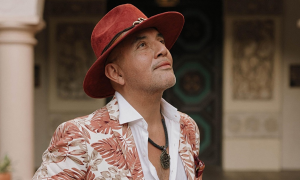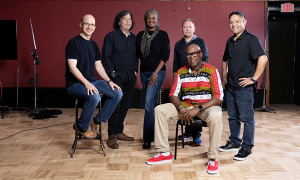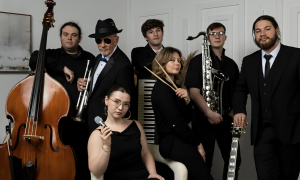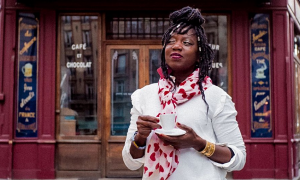Home » Jazz Articles » Take Five With... » Take Five with Markus Rutz
Take Five with Markus Rutz

Courtesy John Nicholls
Meet Markus Rutz
Markus Rutz plays trumpet with bluesy, soulful style and a tone that has been called gorgeous. He composes music from his home base in Chicago, Illinois where he also performs modern jazz. As described by Downbeat's J.D. Considine, with his "big, dark tone and a fluid ease to his phrasing," trumpet player, composer and bandleader, Markus regularly delights audiences in venues throughout his hometown and across the United States.Capturing the same spirit as his dynamic live performances, 2019 marked the release of his third album, Blueprints—Figure One: Frameworks (OA2 Records). With the majority of the album comprised of his own compositions, this new work ranges from duet to sextet, with pieces incorporating Cuban percussion, ballad, bop, West Coast Cool and swing.
Markus began trumpet at the age of nine. His post-secondary musical studies took him to the University of Wisconsin-Madison, Berklee College of Music and the University of New Orleans where he graduated with a Bachelor of Arts.
Forever exploring the bounds of jazz, Markus continues to teach, compose and perform with top musicians from around the globe—plying his horn from New York to London to Brazil and Japan. Open-minded and curious, his musical journey benefits from all that is new and unexpected, courtesy of his global collaborators.
Instrument(s):
I play two horns—one a Bach Stradivarius and the other is a Schilke B5.As a younger person when entering high school, the Bach instrument was recommended by my first trumpet teacher, professor Robert Biederwolf (Mr. B) who was my private instructor from when I was nine years old. I still play the horn which is a model 37 with a medium-large bore. Originally silver-plated, it was replaced with lacquer in 1993 and had the plating stripped of completely in late 2018.
The Schilke B5 is what I play now in most settings. I acquired it is 2016 following a few visits to the factory in Melrose Park, Illinois.
I have played a few other instruments over the years which also were great to play such as a Yamaha—the make played by my nephew Gideon. My very first horn however, a Reynolds Medalist, was a cornet that I now enjoy hearing my nephew Nicholas play.
Teachers and/or influences?
As a learner I have had such good fortune to know and be around many teachers that are nothing short of phenomenal.Robert Biederwolf (Mr. B) was my first teacher from elementary school through high school. He personified patience, calm and good-heartedness. In lessons he emphasized tone production, fundamentals of technique and introduced me to theory as well as trumpet method books and solo trumpet literature.
During my first two years of college, John Aley expanded my trumpet experience guiding me in artistic and scientific (technical) directions. In lessons, we discussed many aspects of trumpet playing and performance in our two years of time together. The learning was also about the role of the trumpet in orchestral, composed solo literature and brass quintet with nuances of stylistic, time period and technical considerations. And, John just brings the horn to life with such soul.
The Bassist,

Richard Davis
bass, acoustic1930 - 2023
My mother and grandmother influenced me in music directly and indirectly, supporting my choices (sometimes cautiously) to pursue a musical path with an understanding that it presents challenges as a profession. My mother plays piano, guitar, other folk instruments such as a dulcimer, and also sings. She has also composed music which is dedicated to her grandsons (my nephews). Through her record collection I was also influenced as a listener by a broad range of musical sound—from Paul Barbaran with Punch Miller, to Ella Jenkins to an album of 17th Century Portugese harpsichord music.
My grandmother was also a major influence on me. She was an educator by profession and had many lessons, experiences as lessons and observations that I take with me as companion lessons. She would sometimes sing and knew more than a few tunes in the repertoire of what is often called the American Standards Songbook. Her record collection had vocalists mainly, as 78s and "more recent" 33s that even included

Thelonious Monk
piano1917 - 1982

Ellis Marsalis
piano1934 - 2020
My sisters Heidi, Judi and Theresa have themselves been influences and teachers at points in time throughout my life. Each has also been involved with music as an instrumentalist, a vocalist or both. During breaks from class while in college I also have good memories of a few jam sessions in the living room in Marshfield, Wisconsin and later, on the back porch in Hamden, Connecticut. Rigor in academic studying habits, artistic design integrity and flow of expression are some of the lessons I've learned from my sisters.
Marie my love and fiancĘŽ and partner has been a significant influence and teacher as well in more recent years. Lessons from her aesthetic sense, determination, personal conduct and experiences have been a new, interesting and happy part of my life. In music for her, the pattern and restatement of theme is essential. Bach is an example and she also has a love of

Charlie Parker
saxophone, alto1920 - 1955
I knew I wanted to be a musician when...
I heard
Miles Davis
trumpet1926 - 1991
Your sound and approach to music.
SOUND"Play with a good tone" was the sage instruction to me from the beginning by my teacher, Mr. B. I'd like to believe that it's part of my sound and playing. Words from others tell me that I did take it to heart. A few years ago, trumpeter

Brian Lynch
trumpetb.1956

Leroy Jones
trumpetb.1958
Early emulation of my personal music heroes may certainly seep through into my playing from the likes of Miles Davis,

Fats Navarro
trumpet1923 - 1950

Clifford Brown
trumpetb.1930

Freddie Hubbard
trumpet1938 - 2008
APPROACH
The approach to trumpet playing I employ has been in development over a long period of time. The emphasis has been on playing the instrument as an extension of everyday breathing and movement. On the belief, cognition and emotional side of the subject, my intention is mindfulness in order to express myself as truthfully as I am able at that moment in time.
Your teaching approach
My approach to the learner is to act as a compass or diving rod, more than as an instruction manual. I am not a proponent of any specific dogma or tradition when it comes to a singular method or set of method books. The beginning of this process is listening, i.e. me listening to the learner.When the core or essence being sought by the learner becomes evident and identified, we can begin to consider what paths to choose to travel together for the journey.
My emphasis is on applying the instrument to musical contexts and style of what we are learning. Knowing music from a few vantage points is something I also consider a benefit that may involve more than one learning method along with an inevitably slower pace for a more thorough understanding and firm memory.
Your dream band
THE HEROESTo play with musical heroes was something I did daydream about, particularly from around the age of 15 years old. In writing now the dreams have expanded to include music mentors and contemporaries.
At the center and in the rhythm section is bassist Richard Davis. Richard is a mentor and was my college professor, always energizing us in ensemble settings and bringing us up a level when he'd play to illustrate a concept or idea. In an interview on Sidran on Record with

Ben Sidran
piano and vocalsb.1943
Bill Evans on piano has always intrigued me and I love the feel and space of his harmony and voicings. Somewhat recently I learned that Bill and drummer Philly Joe Jones preformed together more often than I had known. Both are familiar to me from recordings of Miles Davis' bands and I've always loved the high-hat and toms sound of Philly Joe.
Another member it is beautiful to imagine in the band is

Jim Hall
guitar1930 - 2013

Bill Evans
piano1929 - 1980

Philly Joe Jones
drums1923 - 1985
In the horn section would be

Joe Henderson
saxophone1937 - 2001
COMTEMPORARIES
In the present I muse about an ensemble of contemporaries.
I've had the very good fortune to have already played and recorded with saxophonist
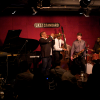
Brice Winston
saxophonePerhaps, as with many in our music universe, I'd name

Brian Blade
drumsb.1970
The bassist would be
Keala Kaumeheiwa
bass, acousticIn the piano chair would be
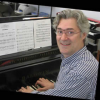
Victor "Red" Atkins
piano
Delfeayo Marsalis
tromboneb.1965
Road story: Your best or worst experience
I've performed in a few states around the Great Lakes part of the Midwest. One place in particular that comes to mind as a "hidden gem." It is Merriman's Playhouse in South Bend, Indiana. We played there first in 2016 and were impressed and gladdened by the turnout from the community and their enthusiastic reception. On our return performance a year later, we were even treated to a standing ovation.The genuine passion Steve and Mary exude as the venue proprietors—complete with pre-concert presentation—is engaging for the audience and appreciated. The capacity and layout is such that it lends itself to listening and compares with clubs across the country.
Merriman's is located at 1211 Mishawaka Ave. South Bend, IN 46615.
Favorite venue
My favorite venue is The Jazz Showcase, which has been here in Chicago since 1947. I first performed there in 2015, and have visited the club many times as a listener for the last 33 years.The first time I was there was on Thanksgiving weekend of 1987 with my mother and grandmother. We heard trumpeter

Art Farmer
flugelhorn1928 - 1999

Clifford Jordan
saxophone, tenor1931 - 1993
Wilbur Campbell
drums
Tony Williams
drums1945 - 1997

Wallace Roney
trumpet1960 - 2020
Of course, being at some of the after-fest sessions following the Labor Day weekend Jazz Festival was something special also.
A few years later, at the same Blackstone location I heard my friend Brian Blade with the

Joshua Redman
saxophoneb.1969
The next set of experiences were at the River North neighborhood location hearing luminaries such as

Benny Golson
saxophone, tenor1929 - 2024

Roy Hargrove
trumpet1969 - 2018

Tom Harrell
trumpetb.1946

Nicholas Payton
trumpetb.1973
The present home for the club at 806 South Plymouth Court in the Printer's Row neighborhood. I've been many times to hear more of the legends of the music such as

Jimmy Heath
saxophone, tenor1926 - 2020
Your favorite recording in your discography and why?
Without hesitation, the recording with the most considered approach and care is the one I just release in autumn of 2019 called Blueprints: Figure One—Frameworks. It represents the last few years of writing, playing and collaboration I've done. Gratitude and reverence are at its heart with titles and themes of original compositions in honor of my love Marie ("Very Marie"), my Mother ("The Compass"), mentor and friend Richard Davis ("The Musicianer") and mentor and professor
Ellis Marsalis
piano1934 - 2020
It was recorded at Transient Sound in Ravenswood neighborhood here in Chicago with saxophonist Brice Winston and bassist

Marcos Varela
bass, acousticNine tracks are performed on Blueprints...; five of them are my own compositions along with selections by

Charlie Parker
saxophone, alto1920 - 1955

Wayne Shorter
saxophone1933 - 2023
First album I bought...
Kind of Blue (Columbia, 1959) by Miles Davis.At this point in time at the age of 14 for me it was spring and into the second semester of my first high school year. The record was the first album of Black American Music for me. The choice was a decision that had followed a period of reflection and centering of my personal intentions and actions. That day in the record store is an event I remember clearly. My thought was that I wanted to listen to some music that aligned with part of myself, feeling and experience. For me as a trumpet player that meant instrumental music that included a trumpet and jazz where I'd observed the instrument had a little more prominent role.
Perusing the recordings (vinyl and cassette tapes) at a local store, the decision became one of two: Kind of Blue.

Wynton Marsalis
trumpetb.1961
What do you think is the most important thing you are contributing musically?
One intention of a contribution to the music is to compose tunes that are enjoyable and interesting for listeners and that are tunes that other musicians both choose to play and find fun to play. The second intention is to contribute a unique playing approach with respect to my musical heroes that brings swing and beauty.Did you know...
I've recently taken to (amateur) photography with my smartphone. I like to capture cityscapes, foods, musical endeavors and the unexpected that may be under-noticed in everyday experience. Another frequent photo subject is our pup Scout who through always_about_scout has her own, dedicated page of Instagram.The first jazz album I bought was:
I've been listening to
Harold Land
saxophone, tenor1928 - 2001

Max Roach
drums1925 - 2007
Music you are listening to now:
Harold Land: A Lazy Afternoon ,
Wayne Shorter
saxophone1933 - 2023
How would you describe the state of jazz today?
The state of the music may be more aptly expressed as the states of the music today, to me. There is such vibrancy and diversity of expression. Beyond that observation and appreciation I may not be a person qualified to render an opinion.One observation however is that—at times—the discourse about the subject seems somewhat more rhetorical in nature or perhaps even academic e.g. individuals and/or groupings of musicians, writers and others appear to actively define and/or identify with beliefs, truth and causes that promote solely one part in the whole of musical experience. The inherent result of divergence of opinions may be a healthy and hopefully not unhealthy set of circumstances. Outcomes that result in community, inclusion and peace leading to diversity, harmony and creativity -those are the ones to which I aspire, value and admire.
What are some of the essential requirements to keep jazz alive and growing?
Sometimes there is a debate between innovation and preservation with musical direction in the genre. I believe both to be essential.What is in the near future?
I began writing this before the present state of pandemic with the words, "This year looks sunny." I'll continue at this stage to write as if we were in a period after pandemic.Blueprints Figure 2, the second of a two-volume record is anticipated in early autumn in partnership with OA2 Records. Along with the release, a short tour is also in store, global environment permitting. This year I have been learning and reviewing the music of Charlie Parker to celebrate his centennial year.
What is your greatest fear when you perform?
The back-and-forth process of playing and talking to announce musicians and tunes is something that have some apprehensions about. because it feels unnatural.What song would you like played at your funeral?
"Flamenco Sketches"What is your favorite song to whistle or sing in the shower?
"Too Young To Go Steady" comes into my mind; more precisely, the song as sung by
Kurt Elling
vocalsb.1967
By Day:
Day by day is how I like to approach some aspects of living along with an alignment of where I/we have been and where I/we are going.If I weren't a jazz musician, I would be a:
In earlier days, I had the idea of opening a small restaurant. I still love cooking and have added to my repertoire over the years and experiences from family recipes to New Orleans dishes. It goes without saying that as a Chicago resident I also experience great restaurants and believe that my cooking will soon incorporate some Italian and Chinese cuisine also.If I could have dinner with anyone from history, who would it be and why?
Theodore Roosevelt is a fascinating character to me. I am reading the biography Theodore Rex by Edmund Morris at this time. The book is his story from the time of his first presidency through the remainder of his lifetime. Mr. Morris also wrote The Rise of Theodore Roosevelt which is from birth until the beginning of his first presidency. I checked out the book from the library while in high school after choosing a Reader's Digest condensed book about him from my mother's bookshelf one winter.What are three things about me that surprise people?
I have an interest in languages and linguistics. I've read more than a few books on the subject of linguistics and have at least some proficiency in Spanish, Hebrew and Cantonese. My love of cooking (and eating) is lifelong. Music overlapped with but came after athletics in my life path. From early on, I was involved with sports—swimming, soccer, schoolyard football, basketball, biking, cross country running, sprinting races in track, pole vaulting and some gymnastics.Tags
Take Five With...
Markus Rutz
Michael Ricci
Chicago
Richard Davis
Miles Davis
Brian Lynch
Fats Navarro
Clifford Brown
Freddie Hubbard
ben sidran
Jim Hall
Bill Evans
Philly Joe Jones
Brice Winston
Brian Blade
Keala Kaumeheiwa
The Jazz Showcase
Art Farmer
Clifford Jordan
Wilbur Campbell
Tony Williams
Wallace Roney
benny golson
Roy Hargrove
Tom Harrell
Gregory Tardy
Nicholas Payton
Jimmy Heath
Ellis Marsalis
Marcos Varela
Charlie Parker
Harold Land
Max Roach
Wayne Shorter
Kurt Elling
Comments
PREVIOUS / NEXT
Support All About Jazz
 All About Jazz has been a pillar of jazz since 1995, championing it as an art form and, more importantly, supporting the musicians who make it. Our enduring commitment has made "AAJ" one of the most culturally important websites of its kind, read by hundreds of thousands of fans, musicians and industry figures every month.
All About Jazz has been a pillar of jazz since 1995, championing it as an art form and, more importantly, supporting the musicians who make it. Our enduring commitment has made "AAJ" one of the most culturally important websites of its kind, read by hundreds of thousands of fans, musicians and industry figures every month.






 Buy Now
Buy Now






